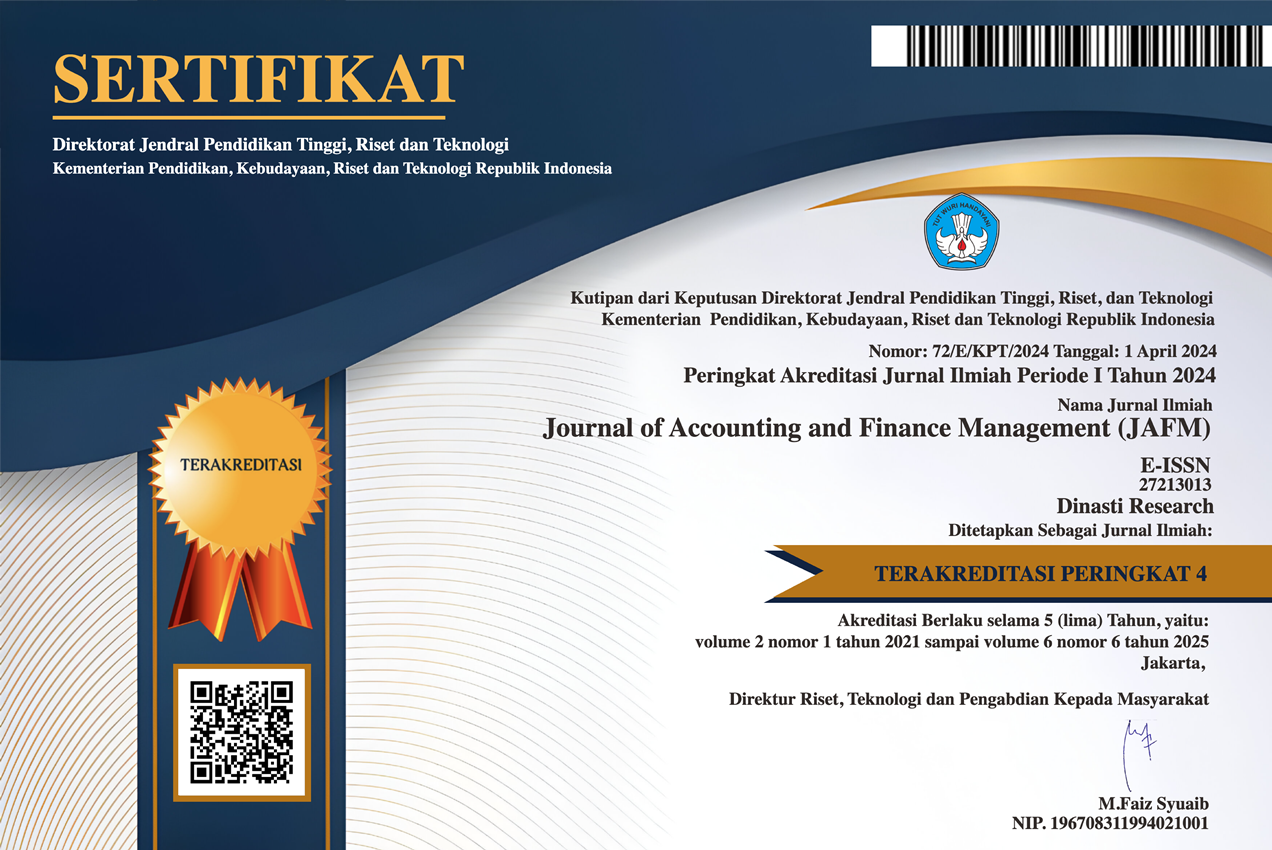Pengaruh Tren You Only Live Once (YOLO) dan Fear of Missing Out (FoMO) Terhadap Kesehatan Keuangan Generasi Muda
DOI:
https://doi.org/10.38035/jafm.v6i5.2595Keywords:
YOLO, FoMO, Kesehatan Keuangan, Generasi Muda, Media SosialAbstract
Fenomena gaya hidup digital yang dipengaruhi oleh tren You Only Live Once (YOLO) dan Fear of Missing Out (FoMO) semakin berkembang di kalangan generasi muda pengguna media sosial, khususnya TikTok. Gaya hidup ini tidak hanya membentuk pola perilaku sosial, tetapi juga berpotensi memengaruhi cara generasi muda mengelola keuangan mereka. Penelitian ini bertujuan untuk mengetahui pengaruh tren YOLO dan FoMO terhadap kesehatan keuangan generasi muda di Indonesia. Penelitian dilakukan dengan menggunakan pendekatan kuantitatif melalui penyebaran kuesioner kepada responden berusia 20–30 tahun yang aktif menggunakan TikTok. Data yang diperoleh mencerminkan persepsi, sikap, dan perilaku keuangan generasi muda terkait dengan tren YOLO dan FoMO. Analisis dilakukan untuk melihat sejauh mana kedua tren tersebut berhubungan dengan kemampuan individu dalam menjaga keseimbangan pengeluaran, menabung, serta mengatur prioritas keuangan pribadi. Hasil penelitian menunjukkan bahwa tren YOLO dapat berdampak positif terhadap kesehatan keuangan apabila dimaknai secara produktif, yaitu sebagai dorongan untuk hidup bermakna, berani mengambil keputusan finansial yang mendukung tujuan jangka panjang, dan menghargai setiap peluang dengan perencanaan yang matang. Sebaliknya, tren FoMO berpengaruh negatif karena mendorong perilaku konsumtif, pembelian impulsif, dan kecenderungan membandingkan diri dengan orang lain di media sosial.
References
Abel, J. P., Buff, C. L., & Burr, S. A. (2016). Social media and the fear of missing out: Scale development and assessment. Journal of Business & Economics Research, 14(1). https://journals.klalliance.org/index.php/JBER/article/view/192
Ajzen, I. (1991). The theory of planned behavior. Organizational Behavior and Human Decision Processes, 50(2), 179–211. https://doi.org/10.1016/0749-5978(91)90020-T
Badan Pusat Statistik. (2024). Jumlah penduduk menurut kelompok umur dan jenis kelamin, 2024.
Barry, C. T., & Wong, M. Y. (2020). Fear of missing out (FoMO): A generational phenomenon or an individual difference? Journal of Social and Personal Relationships, 37(12), 2952–2966. https://doi.org/10.1177/0265407520945394
Baumeister, Roy. F., Bratslavsky, E., & Tice, D. M. (1998). Ego depletion: Is the active self a limited resource? Journal Personality and Social Psychology, 74(5), 1252–1265. https://doi.org/10.1037//0022-3514.74.5.1252
Brüggen, E. C., Hogreve, J., Holmlund, M., Kabadayi, S., & Löfgren, M. (2017). Financial well-being: A conceptualization and research agenda. Journal of Business Research, 79, 228–237. https://doi.org/10.1016/j.jbusres.2017.03.013
Festinger, L. (1954). A theory of social comparison processes. Human Relations, 7(2), 117– 140. https://doi.org/10.1177/001872675400700202
Ghozali, I. (2016). Aplikasi analisis multivariete dengan program IBM SPSS 23, edisi 8 (Semarang). Universitas Diponegoro.
Green, S. B. (1991). How many subject does it take to do a regression analysis. Multivariate Behavioral Research, 26(3), 499–510. https://doi.org/10.1207/s15327906mbr2603_7
Kusumawati, R., & Safitri, D. (2025). Dinamika gaya hidup konsumtif dalam fenomena pinjol pada masyarakat kota. Jurnal Ilmiah Pendidikan IPS, 3(2), 88–93. https://doi.org/10.62383/sosial.v3i1.741
Lee, H., & Oh, H. (2018). Well-being lifestyle and consumption value according to consumers YOLO orientation. Archives of Design Research, 31(1), 71–79. https://doi.org/10.15187/adr.2018.02.31.1.71
Muir, K., Hamilton, M., Noone, J., Marjolin, A., Salignac, F., & Saunders, P. (2017). Exploring Financial Wellbeing in the Australian Context. UNSW Sydney. https://doi.org/10.26190/UNSWORKS/26355
OCBC NISP, & NielsenIQ. (2024). Financial Fitness Index 2024 (p. 70) [Annual Financial Wellbeing Report]. OCBC Indonesia
Pemerintah Indonesia. (2009). Undang-Undang Republik Indonesia Nomor 40 Tahun 2009 Tentang Kepemudaan. https://www.regulasip.id/book/1224/read
Przybylski, A. K., Murayama, K., DeHaan, C. R., & Gladwell, V. (2013). Motivational, emotional, and behavioral correlates of fear of missing out. Computers in Human Behavior, 29(4), 1841–1848. https://doi.org/10.1016/j.chb.2013.02.014
Salignac, F., Hamilton, M., Noone, J., Marjolin, A., & Muir, K. (2020). Conceptualizing financial wellbeing: An ecological life-course approach. Journal of Happiness Studies, 21(5), 1581–1602. https://doi.org/10.1007/s10902-019-00145-3
Song, H. (2017). YOLO and self-control. Korean Journal of Child Studies, 38(5), 1–3. https://doi.org/10.5723/kjcs.2017.38.5.1
Subianto, P., & Rakabuming R, G. (2024). Visi, misi dan program calon presiden republik indonesia 2024-2029. Tim Kampanye Nasional Prabowo-Gibran. https://va.medcom.id/2023/pemilu/others/PRABOWOGIBRAN_VISI_MISI.pdf
Sugiyono. (2022). Metode penelitian kuantitatif, kualitatif, dan R&D. Alfabeta.
The Global Statistics. (2025, April 17). Indonesia TikTok statistics 2025 | TikTok active users. The Global Statistics. https://www.theglobalstatistics.com/indonesia-tiktok-user- statistics/
Vitug, J. (2016). You only live once: The roadmap to financial wellness and a purposeful life. Wiley.
Weida, E. B., Phojanakong, P., Patel, F., & Chilton, M. (2020). Financial health as a measurable social determinant of health. PLoS ONE, 15(5), e0233359. https://doi.org/10.1371/journal.pone.0233359
Yulianto, M. D., Anggraeni, M. D., Alviasari, A., Wicaksono, M. A., Maya, M., Amelia, R., & Rozak, R. W. A. (2024). Pengaruh fear of missing out (FoMO) di media sosial terhadap kesehatan keuangan generasi Z. Jurnal Bisnis Kreatif Dan Inovatif, 1(2), 80– 88. https://doi.org/10.61132/jubikin.v1i2.99
Downloads
Published
How to Cite
Issue
Section
License
Copyright (c) 2025 Laila Amna, Rima Rachmawati

This work is licensed under a Creative Commons Attribution 4.0 International License.
Authors who publish their manuscripts in this journal agree to the following conditions:
- The copyright on each article belongs to the author(s).
- The author acknowledges that the Journal of Accounting and Finance Management (JAFM) has the right to be the first to publish with a Creative Commons Attribution 4.0 International license (Attribution 4.0 International (CC BY 4.0).
- Authors can submit articles separately, arrange for the non-exclusive distribution of manuscripts that have been published in this journal into other versions (e.g., sent to the author's institutional repository, publication into books, etc.), by acknowledging that the manuscript has been published for the first time in the Journal of Accounting and Finance Management (JAFM).



























